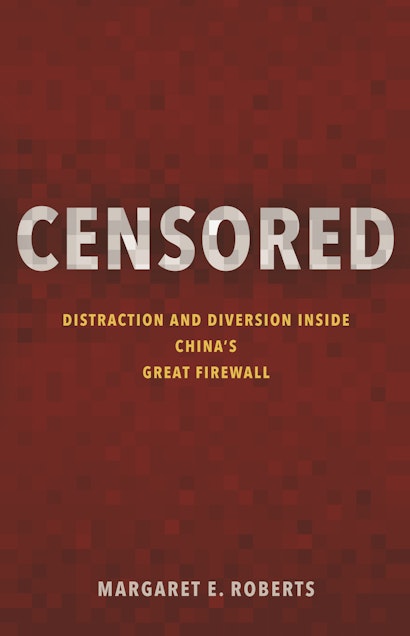As authoritarian governments around the world develop sophisticated technologies for controlling information, many observers have predicted that these controls would be ineffective because they are easily thwarted and evaded by savvy Internet users. In Censored, Margaret Roberts demonstrates that even censorship that is easy to circumvent can still be enormously effective. Taking advantage of digital data harvested from the Chinese Internet and leaks from China’s Propaganda Department, this important book sheds light on how and when censorship influences the Chinese public.
Roberts finds that much of censorship in China works not by making information impossible to access but by requiring those seeking information to spend extra time and money for access. By inconveniencing users, censorship diverts the attention of citizens and powerfully shapes the spread of information. When Internet users notice blatant censorship, they are willing to compensate for better access. But subtler censorship, such as burying search results or introducing distracting information on the web, is more effective because users are less aware of it. Roberts challenges the conventional wisdom that online censorship is undermined when it is incomplete and shows instead how censorship’s porous nature is used strategically to divide the public.
Drawing parallels between censorship in China and the way information is manipulated in the United States and other democracies, Roberts reveals how Internet users are susceptible to control even in the most open societies. Demonstrating how censorship travels across countries and technologies, Censored gives an unprecedented view of how governments encroach on the media consumption of citizens.
Awards and Recognition
- Co-winner of the 2019 Goldsmith Book Prize for Academic Books, Shorenstein Center on Media, Politics and Public Policy at the Harvard Kennedy School
- One of Foreign Affairs' Picks for Best of Books 2018
MargaretE. Roberts is assistant professor of political science at the University of California, San Diego.
"[T]he clearest and most convincing explanation of how information is controlled in today’s China."—Ian Johnson, New York Review of Books
"[A] groundbreaking book . . . although it wears Roberts’s deep knowledge lightly, Censored represents the current state of the art in Chinese internet studies. . . . This book is a must-read for anyone who cares about the free flow of information."—Jonathan Sullivan, New Scientist
"Sometimes you read a book where all you can do is hold your hand up and recognize that this is as good as it gets. Theoretically and empirically sophisticated, Censored is the new state of the art in research on the Chinese Internet censorship regime. Filled with eureka moments, this book helps readers make sense of the complex terrain of China’s authoritarian information order."—Jonathan Sullivan, University of Nottingham
"Censored is a tour de force of original theorizing about the strategic interaction between government censors and Internet users in China and other countries. Chock-full of novel ideas and ingenious research, this brilliant book should be read from Silicon Valley to Washington D.C. and beyond."—Susan L. Shirk, chair of the 21st Century China Center, University of California, San Diego
"In Censored, Roberts takes the deepest dive yet into China’s system of Internet censorship and surveillance. Through a valuable exploration of digital politics, this book helps us understand what makes China so resilient as an authoritarian regime. And as Roberts points out, digital media has made the contrast between democracies and authoritarian regimes less stark."—Philip N. Howard, University of Oxford
"Chinese Internet censorship may be the most sophisticated and far-reaching authoritarian innovation to come out of this information age. This book explains why."—Xiao Qiang, founder and editor-in-chief of the China Digital Times
"It seems difficult to conceive of another country that will be more consequential to the world's future than China, and this book helps explain the regime's strategy for maintaining its control of information now and in the future. Roberts brings an impressive array of appropriate data sources and careful analysis to her nuanced argument."—Tim Groeling, University of California, Los Angeles
"This cogent book contends that the current understanding of censorship is overly focused on fear-based repressive strategies of deletion and encouragement of self-censorship, and shows that governments have expanded abilities to manipulate information in more subtle and effective ways. This is an exciting contribution to our understanding of censorship and information control in China."—Mary Gallagher, University of Michigan


